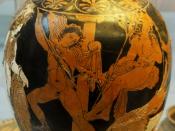Antigone and Oedipus The King, written by Sophocles, are deeply tragic plays with a dramatic ending. In both plays, fate arises the question: could have Creon, Oedipus, Antigone, and the rest of the family, prevented the misfortunes, which fell upon them? Or were their lives cursed upon by determination? With every event that took place, the possibility of another occurrence was either higher or lower. One can see that every action brings upon an ironic outcome. Also, the deadly flaw of hubris can be recognized, though each character expressed it for different reasons. Antigone and Oedipus The King equally display the dramatic genre of a tragedy by combining, among all things, pride, death and punishment.
The willingness to ignore the truth, Brought forth the first sign of disaster towards Oedipus' family. When Laius and Jocasta were told by the prophecy that their own son would be the cause of disaster in their lives, both tried to escape their predestined lives.
The tragic irony emphasizes just how desperately Laius and Jocasta do not want to speak the obvious truth. Both their actions begin a tragic pattern for the rest of Oedipus The King and Antigone. With each event that occurs, another follows based on the actions of the character. In Oedipus, Oedipus thought that by going away from his "mother" and "father", his chances of killing his father and marrying his mother would decrease. Instead, they increased. In Antigone, one can see this pattern as well. By Creon refusing to bury Polynices, Antigone, compelled by her pride, goes against Creon's edict and buries her brother. This pattern arises from each person trying to challenge the others authority.
Many disastrous things happen to the people in both plays, Death being one of them. Nearly every character is killed in...



Tragedy.
The essay has good points, but it is a bit too "showing the obvious" I mean, its its obvious in the play, why still point it out? I understand where you are going in your essay, but i think some reediting woudl make the whole essay flow better.
0 out of 0 people found this comment useful.